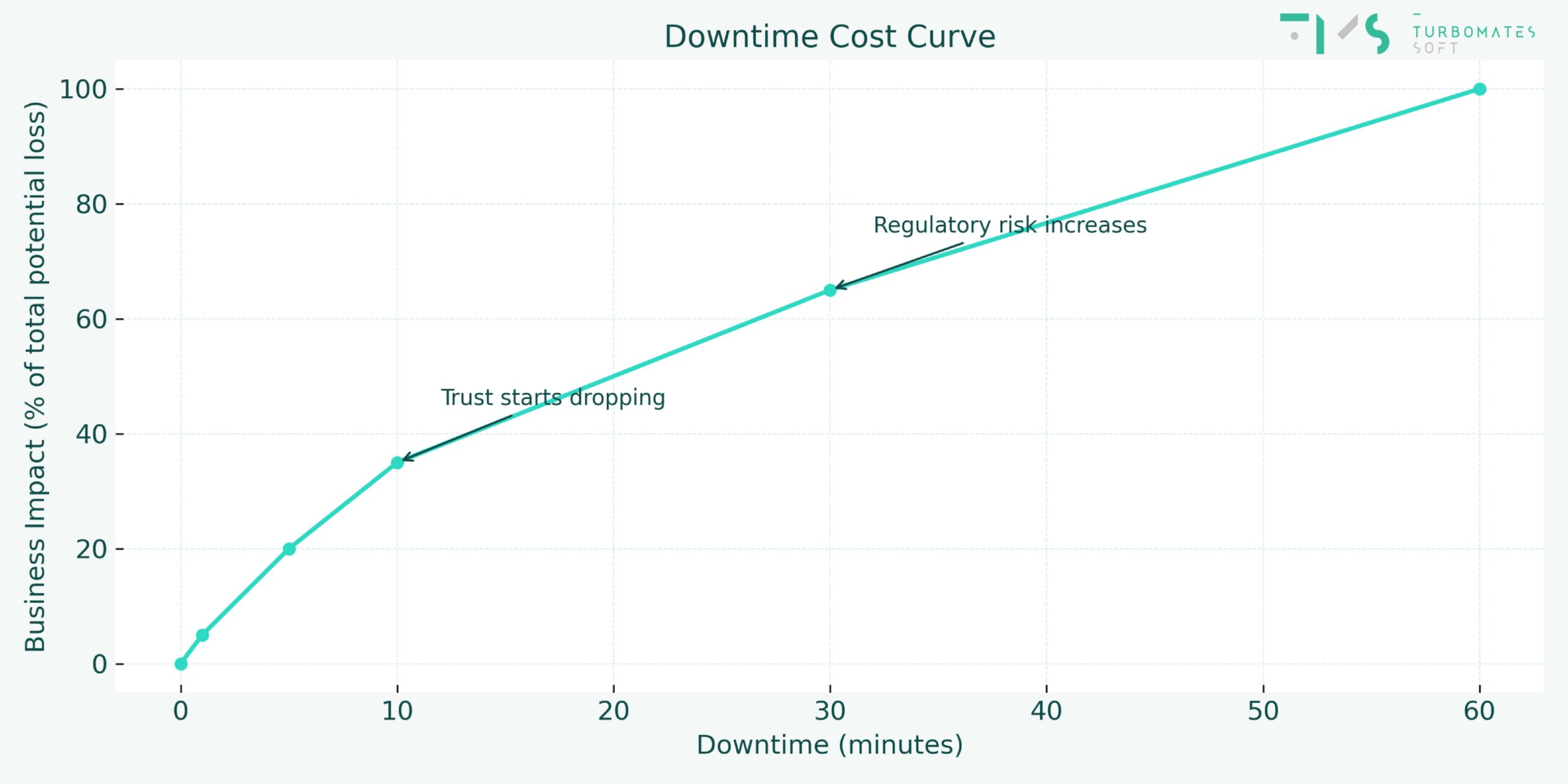When every second counts
In iGaming, performance isn’t a luxury — it’s a lifeline. A short hiccup during a live match, a few seconds of API lag during a jackpot round, or a momentary failure in payment processing can turn a promising platform into a platform players abandon.
We’ve all seen the stories. A sportsbook runs a promo during a Champions League semi-final, traffic spikes, and right as the underdog scores — the odds freeze. Players can’t bet. Trust is lost. Recovery takes days, if not weeks. And in some cases, the brand never fully bounces back.
That’s the unforgiving nature of our industry: when uptime fails, reputation suffers instantly.

Why fault tolerance isn't optional
Unlike traditional SaaS, iGaming platforms operate in real-time environments. Users aren’t just consuming content — they’re making high-frequency, high-emotion financial decisions. And the platform has to respond instantly, 24/7, globally.
Downtime here doesn’t just mean inconvenience. It can mean:
- Financial losses from blocked transactions or failed bet placements
- Player churn, especially during live events
- Negative brand sentiment, which spreads quickly across chat forums and social media
- Regulatory scrutiny, particularly in jurisdictions with strict licensing requirements
In short: it’s not just about uptime. It’s about trust.
| Feature | Why It Matters | Implementation Tip |
|---|---|---|
| Real-time sync | Keeps game state consistent | Use WebSockets or push-based updates |
| API fallback | Prevents total function failure | Circuit breakers + retries |
| Session distribution | No user disruption | Stateless or sticky sessions |
| Pre-launch resilience testing | Find weak spots early | Simulate region-specific outages |
Resilience by design: what we focus on in development
At Turbomates Soft, we don’t manage hosting or server uptime — but we do build platforms with infrastructure readiness in mind. That means designing software that integrates seamlessly with scalable cloud environments, supports failover mechanisms, and minimizes downtime risk.
Here’s what we consider essential during the development phase:
- Modular backend architecture, allowing services to degrade independently
- Asynchronous processing, to decouple UI delays from backend load
- Support for distributed sessions, to ensure session persistence during regional outages
- Integration with multi-region CDNs and failover APIs, through standardized interfaces
“By designing for resilience from the ground up, we ensure that our platforms remain stable, responsive, and quick to recover — even when infrastructure challenges arise.”
When seconds cost trust: a real-world outage
During a high-stakes football event in early 2025, one major sportsbook platform faced a partial outage that lasted nearly an hour. Just as thousands of users rushed to cash out their bets, the feature went dark. Everything else worked — but not the one function that mattered most in the moment.
The backlash was instant. Social media lit up, affiliates raised concerns, and regulators took notice. Not because the code broke — but because the system wasn’t prepared for failure at peak pressure.
In fast-paced betting environments, recovery plans aren’t a luxury. They’re the invisible safety net that keeps trust intact when things go sideways.
Based on current industry expectations, here’s what every modern iGaming platform should support — from a development and architectural standpoint:
1. Real-Time Data Synchronization
Games, bets, balances — all must be synced in near real time across multiple zones. This ensures consistency even during traffic spikes or partial outages.
2. API Failover Support
APIs for games, payments, and KYC should have built-in retry and fallback logic. No third-party integration should become a single point of failure.
3. Distributed Session Management
Players shouldn’t lose their place mid-game. Stateless sessions or session replication help maintain continuity across outages.
4. Resilience Testing During Development
Load testing isn’t optional. Simulating failure scenarios (network latency, database stall, session drops) helps uncover hidden architectural weaknesses before launch.
What fault-tolerant platforms are made of
It’s not just about recovery — it’s about readiness
Building fault tolerance isn’t about planning for disaster recovery after something breaks. It’s about engineering predictability into the system so that disruptions are absorbed, not felt.
That includes:
- Supporting microservice containers that restart autonomously
- Designing systems that isolate failure and contain it
- Using message queues to avoid hard coupling across services
Planning for horizontal scaling before it’s needed
“We don’t build for the best-case scenario. We build for the day traffic doubles, a node fails, and a jackpot hits — all at once.”
🧠 What to Ask When Choosing an iGaming Platform Development Partner
Not every downtime is caused by infrastructure. Sometimes, the real issue lies in how the platform was designed in the first place.
Here are a few key questions to ask your development partner — before scaling traffic or entering new markets:
- Do they understand RTO/RPO principles?
Recovery Time Objective and Recovery Point Objective are critical for designing systems that minimize both downtime and data loss. If your dev team doesn’t build with these in mind, you’re accepting unnecessary risk. - Can they implement fault-tolerant patterns in the backend and APIs?
It’s not just about writing code — it’s about building systems that degrade gracefully. That includes retry logic, circuit breakers, queueing, and smart fallbacks across services. - Do they factor in GEO-based regulation and performance requirements?
Scaling into multiple jurisdictions requires more than translations. It means supporting data sovereignty, regional failover, and latency-aware routing.
A solid development team isn’t just building features — they’re shaping the resilience blueprint of your business.
Final thoughts
iGaming is a demanding space. Competition is fierce. Users are impatient. And infrastructure failure isn’t a matter of if — it’s when.
As a development partner, we at Turbomates Soft understand that real stability starts with software. The best-designed platforms don’t just perform under ideal conditions — they stay usable when parts of the system go offline. And that’s exactly what we aim to deliver in every custom solution and every turnkey platform we build.
Looking to future-proof your next iGaming product? Let’s talk.
👉 What to read next
How to Use Player Communication to Boost Retention in iGaming
Because even the best platform logic can’t save a user who’s already lost trust. Learn how messaging, automation, and timing drive loyalty.
